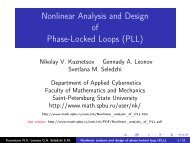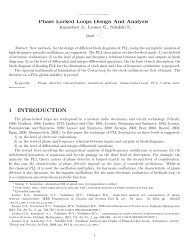Technical Sessions – Monday July 11
Technical Sessions – Monday July 11
Technical Sessions – Monday July 11
Create successful ePaper yourself
Turn your PDF publications into a flip-book with our unique Google optimized e-Paper software.
HC-06 IFORS 20<strong>11</strong> - Melbourne<br />
4 - Analysis of the LNG Market<br />
Mabel Chou, National University of Singapore, 1 Business Link,<br />
BIZ 1, #04-08, <strong>11</strong>7592, Singapore, Singapore,<br />
mabelchou@nus.edu.sg<br />
Prior to the introduction of Liquefied Natural Gas (LNG), movement of natural<br />
gas has been a limitation for gas-producing countries to serve the global<br />
demand. Since the introduction of LNG in the global energy market, gasproducing<br />
countries has more room to commercialise their natural gas reserves<br />
to the gas-consumption countries. With the improvement in LNG technology<br />
and lower investment cost over the years, global LNG trade has been accelerating<br />
and is expected to be of growing importance. We present an overview of<br />
the emergence of LNG market and the current trading patterns.<br />
� HC-06<br />
Thursday, 13:30-15:00<br />
Meeting Room 105<br />
Intelligent Transport Systems<br />
Stream: Transportation<br />
Invited session<br />
Chair: Alberto Colorni, Department of Industrial Design, delle Arti e<br />
della Comunicazione, Politecnico di Milano, c/o Metid, p.zza<br />
Leonardo da Vinci 32, 20133, Milano, Italy, alberto.colorni@polimi.it<br />
Chair: Maurizio Bruglieri, INDACO, Politecnico di Milano, Via<br />
Durando, 38/a, Milano, Italy, maurizio.bruglieri@polimi.it<br />
1 - Carsharing and Carpooling: Two Different MIP Optimization<br />
Approaches<br />
Gonçalo Correia, Department of Civil Engineering, University of<br />
Coimbra, Faculdade de Ciências e Tecnologia. Dep. Eng. Civil,<br />
sala SA 2.8 Rua Luis dos Reis Santos, 3030, Coimbra, Portugal,<br />
gcorreia@dec.uc.pt, Antonio Antunes<br />
Carsharing is often mistaken as being the same as carpooling, while in reality<br />
these are two different transport options: carpooling denotes a system by<br />
which people share their own vehicles mainly in commuter trips in order to<br />
save money on transport costs; whereas carsharing is a near term car rental<br />
mainly suited for city center trips avoiding car ownership and providing the<br />
comfort of using an automobile. For the first alternative we present a MIP<br />
model for finding the best ridesharing groups while for the second we address<br />
the problem of locating depots and assigning trips to vehicles.<br />
2 - A New Agent-based Simulation Procedure to Assess<br />
the Market Potential of Shared Taxis: An Application<br />
to the Lisbon Municipality<br />
Luis Martinez, Civil Engineering, Instituto Superior Tecnico,<br />
Avenida Rovisco Pais, 1049-001, Lisbon, Portugal,<br />
martinez@civil.ist.utl.pt, Gonçalo Correia, José Viegas<br />
This paper presents a simulation procedure to assess the market potential for<br />
the implementation of shared taxi services in urban areas using new ITS solutions<br />
for easy booking and payment from the clients fro the city of Lisbon.<br />
The paper proposes an agent based simulation model in which a set of rules for<br />
space and time matching between the shared taxis and passengers is and then<br />
presents an algorithm that seeks to optimize different interests by conciliating<br />
the perspectives of the clients and the operators.<br />
3 - A New Optimization Procedure to Estimate the Market<br />
Potential of a New Express Minibus Service for the Lisbon<br />
Metropolitan Area<br />
Tomás Eiró, Department of Civil Engineering and Architecture,<br />
Instituto Superior Técnico, Avenida Rovisco Pais, Civil<br />
Engieneering Building, room 4.25, 1049-001, Lisbon, Portugal,<br />
teiro@civil.ist.utl.pt, Luis Martinez<br />
This paper presents a new comprehensive optimization procedure to estimate<br />
the market potential and configuration of a new flexible and demand responsive<br />
Express Minibus service, which integrates the comfort and commercial speed<br />
of the private car and the semi-fixed location of stops and route’s schedules.<br />
The optimization procedure integrates several steps that go from the potential<br />
stops location and the creation of met-demand points that are used to estimate<br />
service during the day using an adaption of a routing-vehicle algorithm.<br />
90<br />
4 - A Carpooling Service for Universities: A Case Study in<br />
Milan<br />
Alberto Colorni, Department of Industrial Design, delle Arti e<br />
della Comunicazione, Politecnico di Milano, c/o Metid, p.zza<br />
Leonardo da Vinci 32, 20133, Milano, Italy,<br />
alberto.colorni@polimi.it, Maurizio Bruglieri, Alessandro Luè,<br />
Diego Ciccarelli<br />
Carpooling is an ITS based on a shared use of private cars. We present the<br />
project to design, implement and test a car pooling service for Università Statale<br />
and Politecnico di Milano universities. At the best of our knowledge no work<br />
in the literature faces the problem of designing a carpooling service for university<br />
students taking into account the needs of this particular class of users e.g.<br />
friend/enemy list, possible multiple destinations, imposition of partial pools.<br />
For this reason we have put right a tailored matching algorithm to form the<br />
crews meeting all these needs.<br />
� HC-07<br />
Thursday, 13:30-15:00<br />
Meeting Room 106<br />
Topics in Combinatorial Optimization IV<br />
Stream: Combinatorial Optimization<br />
Invited session<br />
Chair: Paulo Morelato França, Dept. Matemática, Estatística e<br />
Computação, Universidade Estadual Paulista, Av. <strong>11</strong> de maio 2137,<br />
apto. 172 B, 19061-360, Presidente Prudente, SP, Brazil,<br />
paulo.morelato@gmail.com<br />
1 - Scheduling Wireless Mesh Networks<br />
Celia Glass, Cass Business School, City University, 106 Bunhill<br />
Row, EC1Y 8TZ, London, United Kingdom,<br />
c.a.glass@city.ac.uk<br />
Wireless Mesh Networks provide low cost internet and broadband access, but<br />
have distinct limitations for scheduling. The access points, used e.g. for WiFi,<br />
cannot multi-task. This disposes them to perfect periodic scheduling which offers<br />
both reliability of service, and energy saving. We employ number-theoretic<br />
results to go beyond previous approach, e.g periodicities related by powers of<br />
2, to perfect periodic scheduling. We report on the theoretical approaches and<br />
computational results to demonstrate that perfect periodic scheduling can form<br />
the basis for efficient scheduling of WMNs.<br />
2 - Heuristic Algorithms for Assigning Personalized TV Advertisements:<br />
Deterministic and Stochastic Scenarios<br />
Ron Adany, Computer Science, Bar-Ilan University, 52900,<br />
Ramat-Gan, Israel, adanyr@cs.biu.ac.il, Sarit Kraus, Fernando<br />
Ordonez<br />
We consider the problem of assigning personalized TV ads to viewers with<br />
finite viewing capacity in order to maximize revenue. We consider the deterministic<br />
scenario (DET) and the stochastic scenario (STO) where the viewers’<br />
viewing capacities are uncertain. Since the problem is NP-Hard, we present<br />
heuristic solutions which we evaluated using computational experiments. Our<br />
heuristics for DET, on average, attains 98% of the possible revenue, outperforming<br />
a MIP solver, and our robust heuristics attains almost the same revenue<br />
as DET even when the uncertainty is very high, e.g. 50%.<br />
3 - GRASP with Path-Relinking for two Arc Routing Problems<br />
Fábio Usberti, DENSIS, Universidade Estadual de Campinas,<br />
Av. Albert Einstein, 400, 13083-852 , Campinas, SP, Brazil,<br />
fusberti@yahoo.com, Paulo Morelato França, André Luiz<br />
Morelato<br />
The NP-hard Capacitated Arc Routing Problem (CARP) and Open CARP are<br />
defined on an undirected graph G(V,E), where minimum cost tours must cover<br />
a set of required edges. In CARP tours are constrained to form cycles starting<br />
from the depot, while in Open CARP the tours may start and end at any two<br />
nodes. This work proposes a GRASP with Path-Relinking to solve several instances<br />
from literature, and results reveal that our metaheuristic is competitive<br />
with other state-of-the-art metaheuristics.




